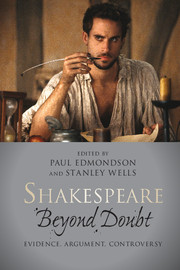Book contents
- Frontmatter
- Content
- List of illustrations
- List of contributors
- General introduction
- Part I Sceptics
- 1 The unreadable Delia Bacon
- 2 The case for Bacon
- 3 The case for Marlowe
- 4 The life and theatrical interests of Edward de Vere, seventeenth Earl of Oxford
- 5 The unusual suspects
- Part II Shakespeare as author
- Part III A cultural phenomenon: Did Shakespeare write Shakespeare?
- Afterword
- A selected reading list
- Notes
- Index
3 - The case for Marlowe
from Part I - Sceptics
Published online by Cambridge University Press: 05 April 2013
- Frontmatter
- Content
- List of illustrations
- List of contributors
- General introduction
- Part I Sceptics
- 1 The unreadable Delia Bacon
- 2 The case for Bacon
- 3 The case for Marlowe
- 4 The life and theatrical interests of Edward de Vere, seventeenth Earl of Oxford
- 5 The unusual suspects
- Part II Shakespeare as author
- Part III A cultural phenomenon: Did Shakespeare write Shakespeare?
- Afterword
- A selected reading list
- Notes
- Index
Summary
Christopher Marlowe has been one of the more popular candidates put forward by ‘anti-Stratfordians’ as the true author of works attributed to William Shakespeare. He has one great advantage over other contenders in that he is a major poet and dramatist in his own right. Against this he has one pressing disadvantage, which is that he was killed in the year 1593, and was therefore dead when most of Shakespeare's plays were written. His proponents (‘Marlovians’) have continously addressed these two aspects of his claim, seeking on the one hand to emphasize his poetic fitness for the role, and on the other to disprove, or anyway to challenge, the historical record of his inconveniently early death. Their default theory is that the apparent death of Marlowe was an elaborate hoax enabling him to disappear to the continent, thereby escaping charges of heresy then being levelled at him. They also note an apparent chronological neatness: the first publication bearing Shakespeare's name – the narrative poem Venus and Adonis – went on sale just a few weeks after Marlowe's death or disappearance.
The Marlovian claim has not been rewarded with any general acceptance, but its propagandists did score a notable victory when they persuaded the Dean and Chapter of Westminster Abbey to permit the inclusion of a question mark by Marlowe's death-date on a commemorative stained-glass window installed at Poets’ Corner in 2002.
- Type
- Chapter
- Information
- Shakespeare beyond DoubtEvidence, Argument, Controversy, pp. 29 - 38Publisher: Cambridge University PressPrint publication year: 2013



